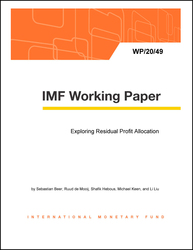
Exploring Residual Profit Allocation
Exploring Residual Profit Allocation
READ MORE...
Volume/Issue:
Volume 2020
Issue 049
Publication date: February 2020
ISBN: 9781513528328
$18.00
Add to Cart by clicking price of the language and format you'd like to purchase
Available Languages and Formats
| English |
Prices in red indicate formats that are not yet available but are forthcoming.
Topics covered in this book
This title contains information about the following subjects.
Click on a subject if you would like to see other titles with the same subjects.
Economics- Macroeconomics , Public Finance , Taxation - General , WP , routine profits , capital stock , closed economy , cost function , earnings before interest and taxes , Residual Profit Allocation , International Corporate Taxation , Multinational Firms , profit shifting , residual profits , RPA scheme , purged profits , Marginal effective tax rate , Corporate income tax , Income , Stocks , Global
Summary
Schemes of residual profit allocation (RPA) tax multinationals by allocating their ‘routine’ profits to countries in which their activities take place and sharing their remaining ‘residual’ profit across countries on some formulaic basis. They have recently and rapidly come to prominence in policy discussions, yet almost nothing is known about their impact on revenue, investment and efficiency. This paper explores these issues, conceptually and empirically. It finds residual profits to be substantial, but concentrated in a relatively few MNEs, headquartered in few countries. The impact on tax revenue of reallocating excess profits under RPA, while adverse for investment hubs, appears beneficial for lower income countries even when the formula allocates by destination-based sales. The impact on investment incentives is ambiguous and specific both to countries and MNE groups; only if the rate of tax on routine profits is low does aggregate efficiency seem likely to increase.
Copyright © 2010 - 2026
Powered by:
AIDC



